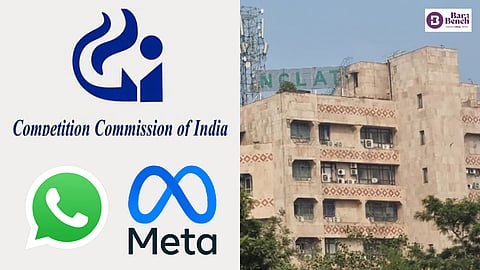
- Latest Legal News
- News
- Dealstreet
- Viewpoint
- Columns
- Interviews
- Law School
- Legal Jobs
- हिंदी
- ಕನ್ನಡ

The National Company Law Appellate Tribunal (NCLAT) on Tuesday set aside the Competition Commission of India (CCI) direction that barred WhatsApp from sharing user data with Meta group companies for advertising purposes. (Meta, WhatsApp v. CCI)
A coram of Justice (retd) Ashok Bhushan, the Chairperson and Barun Mitra, Member (Technical) also set aside the portion of the CCI order that held that Meta engaged in leveraging its dominant position in the OTT messaging app sector to protect its position in the online display advertising market.
The other portions of the order, including the ₹213.14 crore penalty, has been upheld.
In November 2024, the CCI imposed a ₹213.14 crore penalty on Meta, finding that WhatsApp’s 2021 privacy policy update amounted to abuse of dominance. The regulator concluded that the “take-it-or-leave-it” approach imposed unfair conditions on users, undermined autonomy and violated provisions of the Competition Act, 2002.
The CCI directed WhatsApp not to share user data with Meta or its affiliates for five years and further required the platform to specify the purposes of every category of data collected and prohibit making data sharing a precondition for accessing its services in India.
WhatsApp and Meta challenged the order before the NCLAT. In January 2025, the NCLAT stayed both the penalty and the five-year data sharing ban, observing that such a ban could “lead to the collapse of the business model of WhatsApp LLC since the platform is free.” The penalty was stayed subject to WhatsApp/Meta depositing 50 per cent of the amount.
Senior Advocate Amit Sibal, appearing for Meta, argued that the Commission’s findings were based on exaggerations and speculation.
He said that user data was not shared with Meta for advertising purposes except in limited, optional contexts such as “Click to WhatsApp” features. Even there, he noted, users were shown a transparency screen and were not compelled to engage with businesses through that feature.
Senior Advocate Balbir Singh, appearing for the CCI, had earlier submitted that Meta’s size, resources and integration across Facebook, Instagram, Messenger and WhatsApp entrenched its dominance in the messaging app market.
“No other player comes close in terms of user dependence, network effects and cross-platform synergy,” he argued.
Singh said that WhatsApp exploited this dominance by imposing the 2021 privacy policy on a “take it or leave it” basis. Mandatory notifications created what he described as a manufactured sense of urgency, leaving users fearful of losing access to a vital communication tool. The policy also removed the limited opt-out safeguard available under the earlier framework, compelling even those who had rejected cross-platform data sharing in 2016 to now accept it, he argued.
Senior Advocates Kapil Sibal, Mukul Rohatgi and Arun Kathpalia had appeared for Meta and WhatsApp.